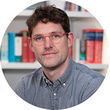- OT
- Life in practice
- Career development
- Hospital passion
Hospital passion
Head of optometry at Moorfields Eye Hospital NHS Foundation Trust, Dan Ehrlich, speaks to OT about his career journey and his professional motivations

26 November 2015
How were you introduced to optometry?
By my elder brother, who is also an optometrist. He seemed to be enjoying university life, training to be an optometrist and having a great time in Manchester. Plus, I was taking physics, maths and biology A level, so optometry seemed to offer a good mix. Quite often I think back to those days as a school student, and I think it is way too early for anyone to know what they are going to do.
When did you start working in a hospital setting?
During my pre reg year with Dolland & Aitcheson we had a one month placement working in Moorfields Eye Hospital in London. While I was there, I saw patients in low vision clinics. It was really challenging in many ways. I remember people saying to me: why do you want to do that, it must be so depressing? Although patients are often struggling to come to terms with the knowledge that their sight cannot be restored it is incredibly important and so rewarding to be able to offer some help and support to people at a time when they are in distress and in need. That’s what drew me in. Later, when Janet Silver OBE, former principal of optometry at Moorfields, called me up and asked if I would like to apply for a job, I remember thinking: do you mean me? I was chuffed about being approached – and I guess I have now gradually climbed the “greasy pole.”
Has practice changed in your time?
Hospital practice has changed massively. We still play a vital role in “core” optometry refraction Low vision assessment, and contact lenses, and our work remains very fragmented as we don’t do a traditional eye examination at all within hospital. We have increasing opportunities now in extended roles in almost every ophthalmic subspecialty from cataract, glaucoma and AMD clinics to laser lists, especially in the last 10 years.
What is the relationship like with peers in ophthalmology?
The respect that we have from our ophthalmology colleagues, the things we have been invited to do, is unique. And this does not happen in the US, and it does not happen in Australia. In those countries, the professions are very uneasy around each other. In the UK we have a very good working relationship.
What drives your passion for the profession?
There is something for me about having an impact on the individual patient. Although today I get to do very little clinical work; my only clinics are contact lens patients. But in those clinical sessions, there are patients who come in that may not have been able to see for years, and you can transform their lives. You can do that in community practice too, but the diverse roles that we can have – the range of work that we have, and to be able to turnaround and discuss cases with colleagues, the opportunity to work with international experts, – I do not think that is available in any setting other than in a hospital.
Any career regrets?
Personally, I have had the opportunity to gain expertise I feel I could not have gained anywhere else (in my area of clinically necessary contact lenses). So although I miss clinical practice now that I am head of department (managing over 150 staff), I am now helping to develop the role of optometrist in hospital and I feel I can have a greater impact on patient care. I could not have asked for a better career.
Advertisement


Comments (0)
You must be logged in to join the discussion. Log in